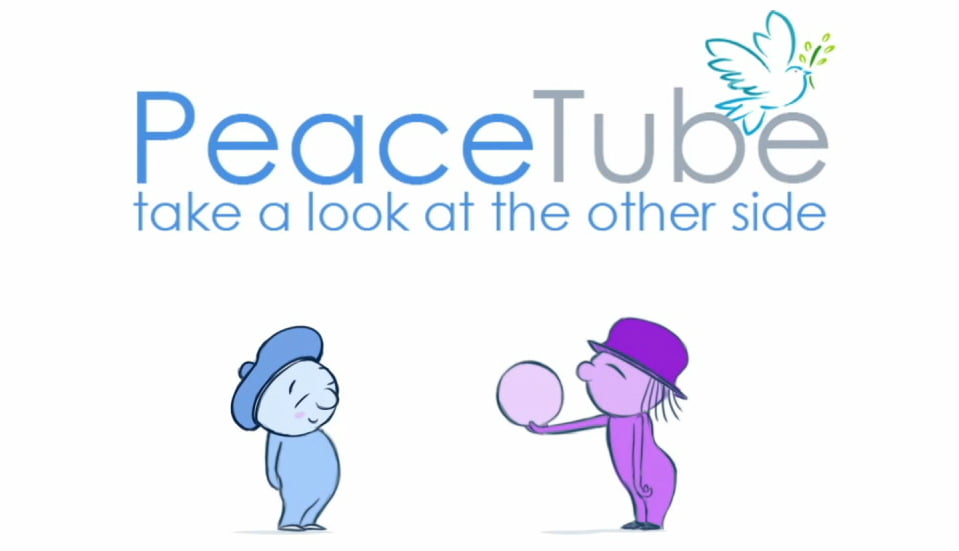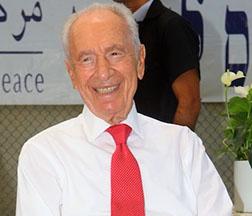Thomas L. Friedman’s bestselling book “The World is Flat” describes globalization and the internet, which allows billions of users worldwide to connect. While some choose to use this “flat world” for commerce or finding friends online, others, such as Israeli project PeaceTube, set grander goals, like promoting world peace.
The PeaceTube Project, a nonprofit project founded in 2011 by two Israeli friends, Lior Penso and Ziv Tubin, along with American CTO Ron Gejman, connects people from opposite sides of conflicts, with the aim of creating a basis for tolerance and dialogue.
Related articles
- President Peres Launches Savvy New Media Campaign Urging Israelis To Vote
- Deeyoon: Debate Anyone, About Anything On Video Chat
The PeaceTube platform, which is still in development, will allow users to have anonymous interactions through video-chat. The system is based on the Facebook API and prioritizes users according to conflict. For example, Israelis will be paired with Lebanese or Syrians, Russians with Georgians, Indians with a Pakistanis and so on. The system will also draw on user’s personal information, in order to create common grounds for conversation.
“As the mediator – we tell the parties about the similarity between them,” says founder Penso, “Imagine for example two users that are Barcelona FC fans, this in itself may induce a better atmosphere for conversation and may increase the chances of progress in dialogue between them.” In the same way the system also appropriates users by age range.
[youtuber youtube=’http://www.youtube.com/watch?v=127QDS7KzV4′]
Battling ignorance to promote peace
“Through the platform – we try to enrich the educational experience, since ignorance is the biggest obstacle to the project’s intentions,” says Penso. Accordingly, PeaceTube’s system adds relevant information about the other user’s country, such as its size, its capital city, segmentation of religions etc.
Using the Facebook API, PeaceTube can ensure that behind the user there is an actual person.
Similarly to the “like” button, users have the option to make an in-system gesture and if the other user “likes” them back, they can choose to expose their full name on Facebook, which can be the beginning of a long-term friendship.
“It all started in 2011 during the revolution in Egypt,” Penso tells NoCamels, “there were dozens of different TV Channels and commentators, each of which describes the situation as they see fit.” Penso says that he was longing for an option to “directly contact someone who is actually there and ask them how they see things happening are and to hear their voice.”
According to Penso – PeaceTube can help overcome beliefs that may be presented by leaders or live media: “It’s always easier to show the other side as cruel and generate propaganda,” says Penso, “our platform allows people to bypass the interpretations and prejudices and just talking directly.”
Sign up for our free weekly newsletter
SubscribeCollaborating with the Peres Center for Peace
Yet to be launched officially, most of the project’s marketing is viral. “Before we even had the system code, we made a video that describes exactly who we are and what we do,” Penso tells NoCamels. “After that video, lots of people realized the importance of the project and asked to join.”
The number of volunteers to date is about 30, both Israelis and non-Israelis. “Every one of them contributes in a few areas,” says Penso. “We even have a volunteer in Ramallah in the West Bank. She helps us to spread the word and is the project’s ‘ambassador’ in the area.”
In its early stages, the project was revealed to the Peres Center for Peace, which according to Penso, is a natural partner for the PeaceTube project. “They support us, primarily conceptually,” says Penso. “When the rollout occurs, we will have to raise money, particularly to support the maintenance of the site and public relations purposes,” says Penso.
Educating future generations
The founders say they also hope their tool can be used in education. “A teacher in the US suggested that we develop a permanent video session between classes all around the world, so that middle school students will learn about other cultures and the need for dialogue,” says Penso. Beyond that, founders aim to put the PeaceTube platform on leading news website, so readers would be able to “PeaceTube about it.”
Last February, PeaceTube was recognized by The United Nations Alliance of Civilizations (Partnered with MIT) with Honorable Mention for “The efforts and development of a mobile app that enables new avenues for intercultural dialogue.” Penso explains: “We aim to make PeaceTube a worldwide brand for the dissemination of knowledge and good intentions among people – a safe place [which allows people] to develop dialogue. We believe that the interpersonal interaction is an important step towards changing the nature of perception of the other side,” says Penso.
The PeaceTube team is currently working on its Beta launch and hope it will be ready in the next couple of months.
Photo: PeaceTube
Related posts

Rehabilitation Nation: Israeli Innovation On Road To Healing

Israeli High-Tech Sector 'Still Good' Despite Year Of War






Facebook comments